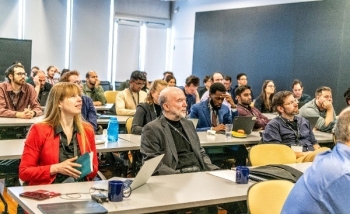Il est évident que les technologies quantiques et de l’IA sont prometteuses. Elles façonneront l’industrie de demain. Et elles ont déjà commencé, avec un nombre croissant de jeunes entreprises au Canada et dans le monde entier offrant à leurs clients un avantage quantique avec lequel l’informatique classique ne peut rivaliser, ainsi que des outils d’IA qui changent le paysage de la main-d’œuvre.
L’industrie quantique canadienne est à la recherche des experts talentueux et qualifiés. Les étudiants diplômés en physique de l’Institut Périmètre et des Universités canadiennes sont prêts et compétents. Cependant, il peut être difficile de convertir l’expertise universitaire en une opportunité déterminante pour leur carrière.
Sur la photo : Estelle Inack décrit leur parcours dans le développement de solutions intelligentes quantiques pour la finance.
La découverte d’un algorithme quantique amélioré, par exemple, peut donner lieu à une publication évaluée par des pairs et représenter une avancée scientifique évidente. S’il n’est pas accompagné d’une analyse de rentabilisation, s’il ne satisfait pas à un besoin ou ne résout pas un problème, il ne sera pas un produit à succès dans le domaine industriel.
Ce mini-cours vise à aider les étudiants à relever le défi de transformer la théorie et l'expérience en application.
« Depuis que j’ai débuté mon travail à l’Institut Périmètre en 2017, j’ai constaté une augmentation considérable des opportunités pour les étudiants diplômés et les postdoctorants dans le domaine de l’informatique quantique. Mais la transition du milieu universitaire vers l’industrie exige des compétences uniques », explique Lauren Hayward, membre du corps professoral de l’Institut Périmètre et organisatrice du mini-cours.
M. Hayward a collaboré avec l’équipe des trajectoires de carrière de l’Institut Périmètre pour soutenir les jeunes physiciens théoriciens dans l’exploration des chemins de carrière dans le domaine quantique.
« Les participants devraient quitter le mini-cours sur les trajectoires de carrière dans le domaine quantique et l’IA avec des compétences pratiques en méthodes de calcul pour les applications industrielles quantiques, ainsi que de nouvelles connexions réseau », explique Hayward.
Tout au long de la semaine de cours, Roger Melko, chercheur à l’Institut Périmètre, et Mohamed Hibat Allah, scientifique à l’Université de Waterloo, ont donné des cours sur la modélisation générative. En outre, Martin Ganahl, de SandboxAQ, a enseigné aux participants les réseaux de tenseurs et les algorithmes quantiques. Grâce à l’apprentissage automatique, ces deux techniques peuvent résoudre des problèmes complexes du monde réel.
Par exemple, la fondatrice de la start-up quantique ForeQast, Aida Ahmadzadegan, qui s’est également entretenue avec les étudiants, utilise des algorithmes quantiques pour aider ses clients à trouver le meilleur itinéraire pour la livraison du dernier kilomètre.
Joan Arrow, doctorante à l’Institut d’informatique quantique de l’Université de Waterloo, a été inspirée par les possibilités offertes. « Le fait d’entendre des PDG, en particulier des femmes, raconter comment elles ont lancé leur propre entreprise et leur parcours dans ce domaine a été très précieux pour moi, car j’ai aussi des aspirations entrepreneuriales », a-t-elle déclaré.
Le cours comprenait des ateliers pratiques de codage et des conférences d’intervenants qui sont passés du monde universitaire à l’industrie quantique.
Le point culminant de la semaine a peut-être été l’occasion de nouer des contacts avec des représentants d’entreprises quantiques prospères, notamment Xanadu, 1QBit et SandboxAQ.
Avec toutes les promesses des technologies quantiques et de l’IA, il est facile de se laisser emporter par le battage médiatique futuriste qui les entoure. Ce qui est parfois justifié. Cependant, les experts en quantique doivent également réfléchir sérieusement aux changements sociaux que ces technologies pourraient apporter.
Une partie du mini-cours a été consacrée à l’éthique quantique, ce qui a aidé les étudiants à comprendre les ramifications potentielles des technologies quantiques. Arrow, PDG du Projet d’éthique quantique, établi en 2021, a déclaré que la principale motivation de l’organisation est de favoriser de véritables discussions sur les implications sociales de la technologie quantique.
« Nous considérons l’avantage quantique comme une chose universellement positive », a-t-elle déclaré. « Mais lorsque nous pensons à ces technologies en termes économiques et sociaux, nous commençons à nous poser des questions. Pour qui l’avantage quantique? Qui va vraiment profiter de la technologie? Et si des gens doivent en subir les conséquences, qui seront-ils? »
Il est crucial que ces discussions soient menées et prises au sérieux, en même temps que la valeur commerciale et industrielle que les technologies quantiques et de l'IA créent.
Il est crucial que ces discussions soient menées et prises au sérieux, en même temps que la valeur commerciale et industrielle que les technologies quantiques et de l'IA créent.
Il est crucial que ces discussions soient menées et prises au sérieux, en même temps que la valeur commerciale et industrielle que les technologies quantiques et de l'IA créent.
Les entreprises et les organisations à but non lucratif représentées comprenaient 1QBit, Agnostiq, Amazon Web Services, ForeQast, IBM Quantum, Nord Quantique, Quantum Valley Ideas Lab, SandboxAQ, Xanadu, yiyaniQ et ZebraKet.
Further exploration
À propos de l’IP
L'Institut Périmètre est le plus grand centre de recherche en physique théorique au monde. Fondé en 1999, cet institut indépendant vise à favoriser les percées dans la compréhension fondamentale de notre univers, des plus infimes particules au cosmos tout entier. Les recherches effectuées à l’Institut Périmètre reposent sur l'idée que la science fondamentale fait progresser le savoir humain et catalyse l'innovation, et que la physique théorique d'aujourd'hui est la technologie de demain. Situé dans la région de Waterloo, cet établissement sans but lucratif met de l'avant un partenariat public-privé unique en son genre avec entre autres les gouvernements de l'Ontario et du Canada. Il facilite la recherche de pointe, forme la prochaine génération de pionniers de la science et communique le pouvoir de la physique grâce à des programmes primés d'éducation et de vulgarisation.
Ceci pourrait vous intéresser


